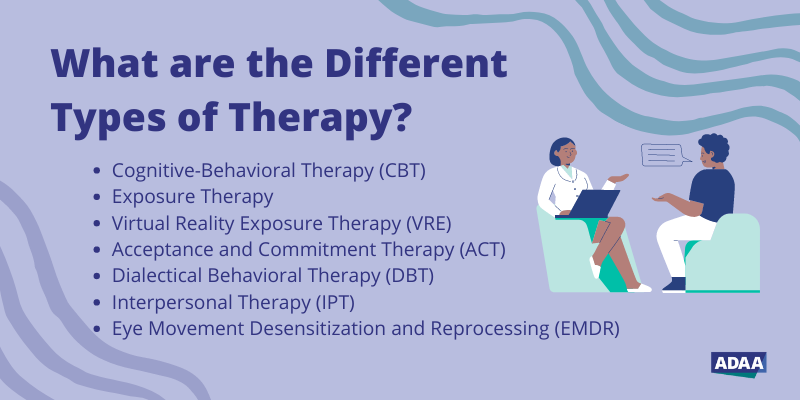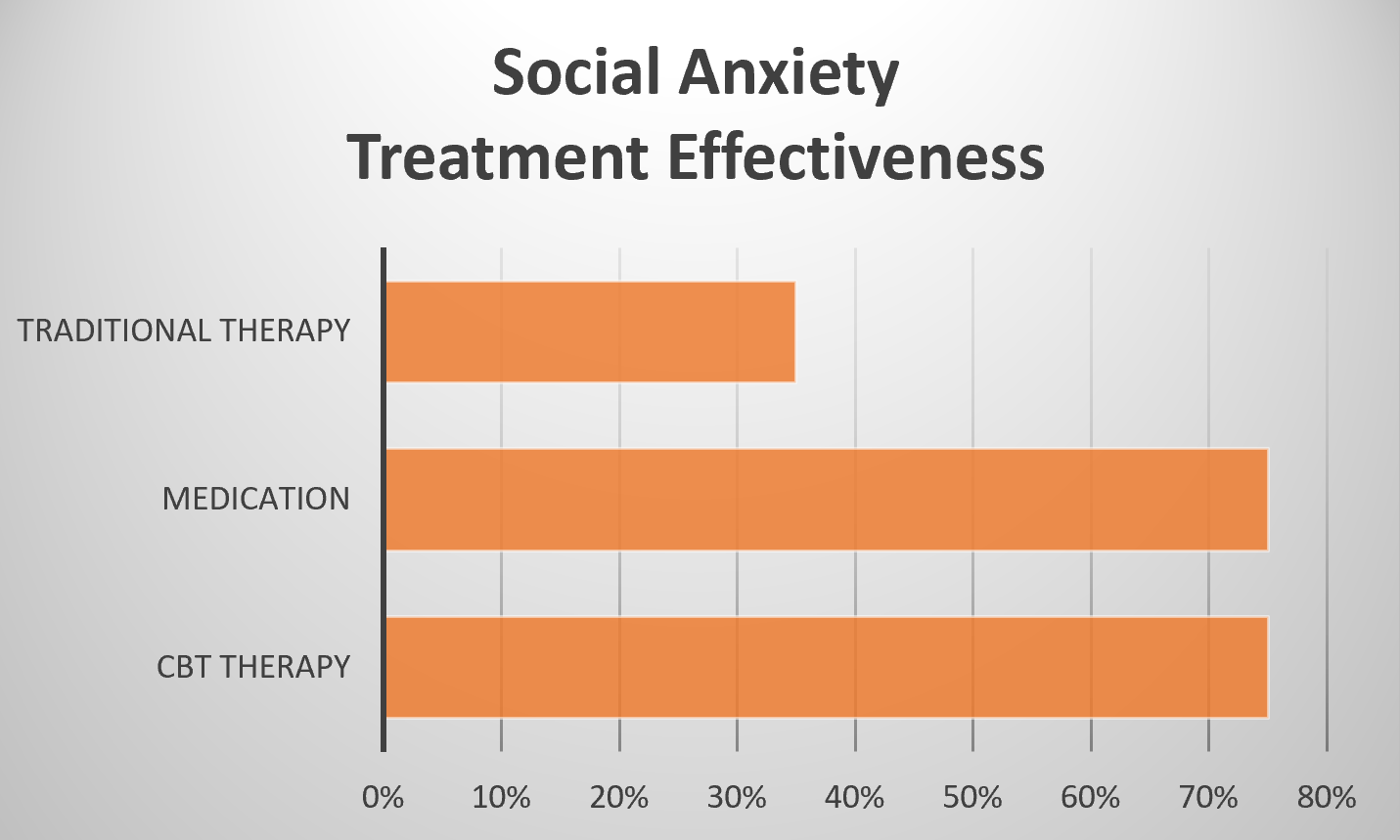Exploring Different Approaches in Therapy for Anxiety Condition for Long-term Adjustment
When dealing with stress and anxiety disorders, it's essential to explore a selection of counseling techniques. Each technique uses unique insights and tools to aid you manage your signs efficiently. You might find that integrating methods can produce the most effective outcomes. Comprehending the subtleties of these techniques is crucial to cultivating lasting adjustment. What if the best combination could release a new level of emotional wellness for you?
Recognizing Anxiety Problems: A Quick Review
Anxiousness problems, which influence numerous people worldwide, can significantly impact daily life. You may experience overwhelming feelings of concern or fret that appear irrepressible. These feelings can cause physical signs like an auto racing heart, sweating, and even wooziness. Usual kinds of stress and anxiety conditions include generalized stress and anxiety problem, panic attack, and social stress and anxiety problem. Each has one-of-a-kind signs, but they all share a propensity to interrupt your routine and relationships.Understanding the root creates of your stress and anxiety is crucial. It might originate from genes, brain chemistry, or life experiences. Recognizing your triggers can aid you handle your feedbacks better. It is essential to remember that you're not the only one in this struggle. Several people encounter similar obstacles, and looking for assistance is a strong action toward feeling much better. By discovering anxiety problems, you're currently on the path to understanding and managing your problem more effectively.
Cognitive-Behavioral Treatment: Testing Unfavorable Idea Patterns

Determining Unfavorable Idea Triggers
When you run into minutes of distress, recognizing the specific triggers behind your negative thoughts can be important in taking care of anxiousness. Beginning by taking notice of scenarios that prompt sensations of fear or concern. Is it a congested room, an approaching due date, or a conversation with specific individuals? Write down these circumstances in a journal. This will help you identify patterns in your reasoning. Notice physical sensations that accompany your adverse thoughts, like a racing heart or rigidity in your chest. By pinpointing these triggers, you obtain understanding into what's sustaining your anxiousness. Recognizing these links is the very first step in testing those ideas and eventually regaining control over your emotional reactions.

Replacing Ideas With Positives
Testing unfavorable thought patterns is a vital action in changing your way of thinking and minimizing anxiety. You may often discover yourself caught in cycles of insecurity or disastrous thinking. As opposed to allowing these ideas dictate your sensations, practice replacing them with positive affirmations or practical alternatives. When you assume, "I can't manage this," move it to, "I can manage challenges one step at a time." This easy adjustment can substantially influence your emotional state. On a regular basis recognizing and countering these unfavorable thoughts helps create a much healthier internal dialogue. Keep in mind, it takes some time and effort, however regularly exercising this method can result in long lasting change, encouraging you to face stress and anxiety with renewed self-confidence and resilience
Building Coping Approaches With Each Other
Replacing unfavorable ideas is just the start of taking care of anxiousness efficiently. To develop enduring adjustment, you need to develop coping techniques that empower you. Cognitive-Behavioral Therapy (CBT) aids you determine and test those unhelpful thought patterns. Together, you and your counselor can check out how these ideas effect your feelings and behaviors.Start by creating functional techniques, like journaling or mindfulness exercises, that enable you to face anxiousness head-on. When you face your concerns slowly, you'll learn to respond in different ways.

Mindfulness and Acceptance-Based Approaches: Cultivating Present-Moment Understanding
As you navigate the complexities of anxiety, incorporating mindfulness and acceptance-based approaches can significantly boost your ability to grow present-moment awareness. By focusing on the present moment, you'll locate that you can observe your thoughts and feelings without judgment. This technique assists you acknowledge your stress and anxiety without really feeling bewildered by it.Engaging in mindfulness exercises, such as deep breathing, body scans, or directed reflections, enables you to ground yourself in your existing experience. Acceptance-based strategies encourage you to welcome your emotions instead of battle versus them. They shed their power over you.Incorporating these methods right into your everyday regimen can transform exactly how you react to anxiety when you accept your feelings. You'll create resilience and find out to browse demanding circumstances with greater simplicity. Eventually, cultivating present-moment understanding lays the foundation for lasting modification, empowering you to lead an extra meeting life.
Exposure Treatment: Challenging Concerns Gradually
Direct exposure treatment aids you challenge your worries in a gradual method, making it less overwhelming. You'll discover strategies to deal with anxiety-provoking circumstances step by step, while additionally developing coping methods to manage your reactions. This strategy encourages you to take control and decrease stress and anxiety in time.
Steady Direct Exposure Strategies
When facing anxiety, gradually facing your worries can be a powerful method to regain control. This technique, called gradual direct exposure, involves slowly revealing on your own to the scenarios or objects that cause your stress and anxiety. Beginning with less daunting scenarios and slowly work your means as much as even more challenging ones. For example, if you hesitate of public talking, you may begin by speaking before a mirror, after that proceed to sharing ideas with a close friend, and ultimately resolve a little group. Each step aids desensitize you to the concern, constructing your confidence with time. Keep in mind, it's important to rate yourself and commemorate little triumphes as you relocate through this procedure, enhancing your capability to manage anxiousness successfully.
Building Coping Methods
Structure effective coping approaches is essential for taking care of anxiety, especially as you challenge your fears gradually. One effective approach is direct exposure treatment, where you start by facing your worries in a regulated way. Begin with less frightening scenarios and gradually function your way approximately more tough scenarios. This steady exposure assists desensitize you to anxiety triggers, making them much less overwhelming.Incorporate relaxation techniques, such as deep breathing or mindfulness, to soothe your mind throughout exposure. Track your development, celebrating small success in the process to improve your self-confidence. Keep in mind, it's all right to take your time; the objective isn't excellence yet stable enhancement. his explanation By developing these approaches, like it you'll encourage on your own to browse stress and anxiety and embrace life a lot more completely.
Psychodynamic Therapy: Uncovering Origin of Anxiousness
Psychodynamic treatment explores the subconscious mind, exposing the origin causes of your anxiety - Counseling services for anxiety. By analyzing your ideas, sensations, and previous experiences, this approach helps you reveal underlying disputes and unresolved problems that may add to your present anxiousness. You'll deal with a therapist to explore youth experiences, connections, and psychological patterns that shape your feedbacks today.As you acquire understanding into these much deeper layers of your subconscious, you'll start to acknowledge just how past occasions influence your present actions. This understanding can result in catharsis, enabling you to process emotions you could have suppressed.Through the healing connection, you can additionally identify defense mechanisms that may have established gradually, using a more clear path to alter. Inevitably, psychodynamic treatment outfits you with the tools to address your stress and anxiety at its core, advertising long-term improvement in your emotional wellness
Alternative and integrative Methods: Incorporating Methods for Greater Effectiveness
Incorporating different healing strategies can boost your journey toward handling anxiousness better. By integrating aspects from cognitive-behavioral treatment, mindfulness methods, and alternative techniques, you can create a personalized strategy that resolves your one-of-a-kind needs. As an example, you may utilize cognitive-behavioral methods to challenge unfavorable thought patterns while integrating mindfulness exercises to ground on your own in the existing moment.Additionally, checking out all natural practices such as yoga exercise or meditation can promote leisure and minimize anxiety signs. This blend allows you to establish greater self-awareness and resilience.Experimenting with these diverse approaches can assist you uncover what reverberates most with you. Bear in mind, it's about finding a synergy that functions, instead of staying with a single strategy. This integrative technique not only supplies immediate relief however likewise promotes long-lasting skills for taking care of stress and anxiety, equipping you to reclaim control over your life.
The Role of Assistance Solutions: Structure Strength With Link
While it might appear that handling stress and anxiety is a singular trip, having a solid support group can play an important role in your strength. Bordering on your own with compassionate pals, household, or support system creates a safe room where you can honestly share your feelings and experiences. When you get in touch with others, you advise on your own that you're not the only one in this struggle.These partnerships provide motivation and can offer functional coping approaches that have actually benefited others. It's also a possibility to get perspective; good friends can assist you see situations in different ways, decreasing feelings of isolation.Moreover, emotional assistance fosters a sense of belonging, which can considerably alleviate anxiousness signs and symptoms. By leaning on your support system, you can develop resilience and take on challenges a lot more properly. Bear in mind, getting to out for assistance suggests strength, and it can make all the distinction in your trip toward managing anxiety.
Frequently Asked Inquiries
What Are the Common Symptoms of Anxiousness Disorders?
You could experience restlessness, exhaustion, difficulty focusing, irritation, muscle stress, and rest disturbances. Physical symptoms can consist of quick heart beat, sweating, and shivering. Identifying these signs early can aid you look for appropriate assistance and treatment.

How Much Time Does Therapy Normally Last for Stress And Anxiety Conditions?
Treatment for anxiousness disorders generally lasts anywhere from a couple of weeks to numerous months. It truly relies on your private needs, progression, and the methods your specialist makes use of to aid you manage your anxiousness efficiently.
Can Medication Be Made Use Of Alongside Treatment for Anxiety?
Yes, medicine go to my blog can absolutely be made use of alongside treatment for anxiousness. Incorporating both methods usually improves therapy effectiveness, aiding you take care of signs while exploring underlying issues via therapy. Always consult your health care supplier for tailored advice.
Are There Self-Help Methods for Managing Anxiousness?
Yes, there are several self-help methods for taking care of anxiety. You can practice mindfulness, engage in normal exercise, keep a well balanced diet regimen, develop a regular, and utilize deep breathing methods to help reduce anxiety signs properly.
Just how Do I Know if I Required Professional Assistance for Anxiety?
You need to think about seeking professional aid for anxiety if it interrupts day-to-day live, triggers considerable distress, or if self-help strategies aren't working. Trust fund your reactions; connecting can result in better coping abilities and assistance. Typical types of anxiousness problems include generalized stress and anxiety problem, panic problem, and social anxiety disorder. When you experience minutes of distress, recognizing the specific triggers behind your adverse ideas can be important in taking care of stress and anxiety. Changing unfavorable ideas is only the beginning of taking care of anxiousness effectively. By examining your thoughts, feelings, and previous experiences, this method aids you uncover underlying conflicts and unsettled issues that might add to your existing stress and anxiety. It's likewise a possibility to obtain point of view; close friends can aid you see situations in a different way, minimizing sensations of isolation (Counseling services for anxiety).Moreover, psychological support cultivates a sense of belonging, which can significantly minimize anxiety signs